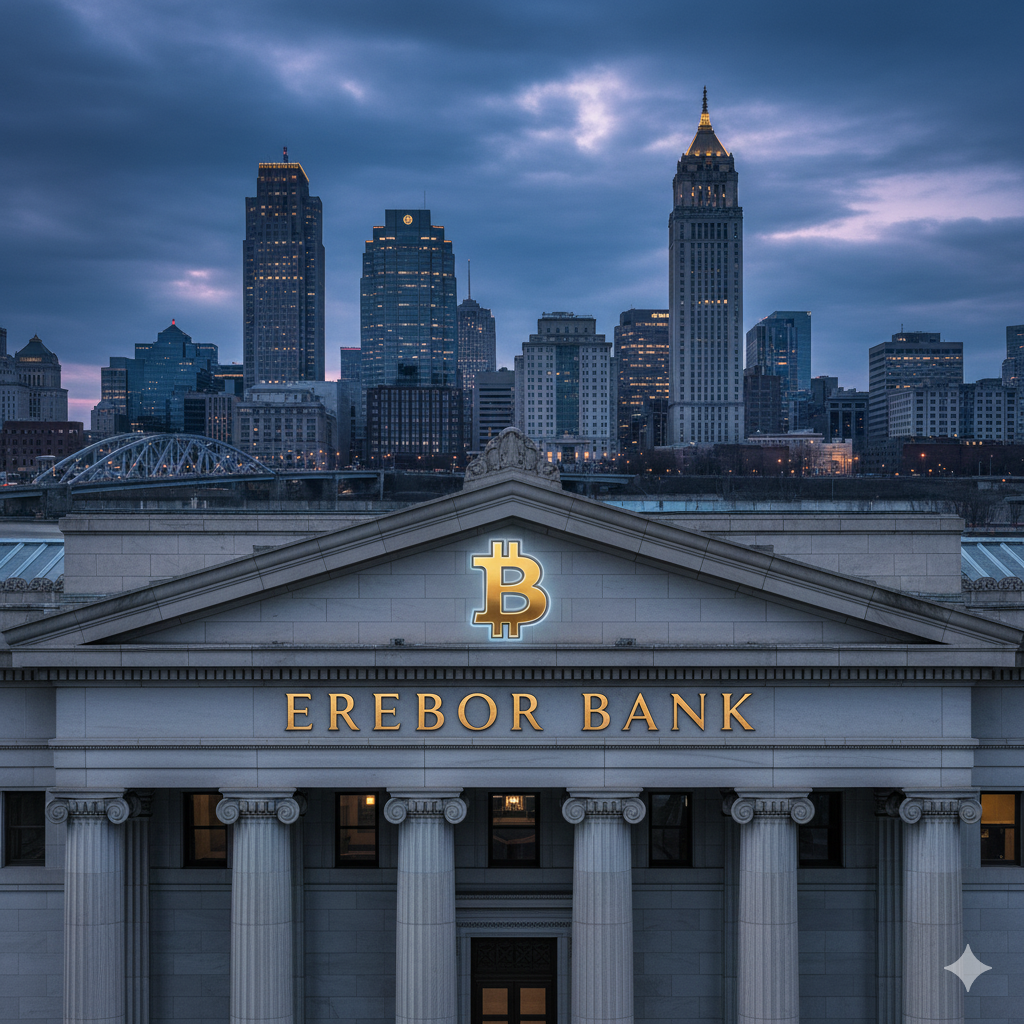Silicon Valley-Backed Erebor Gets Federal Green Light

The Office of the Comptroller of the Currency granted preliminary conditional approval to Erebor Bank on October 15, 2025, marking a watershed moment for crypto-focused banking in the United States. Founded by tech luminaries Palmer Luckey and Joe Lonsdale with backing from Peter Thiel's Founders Fund, Erebor aims to fill the void left by Silicon Valley Bank's collapse while positioning itself as "the most regulated entity conducting and facilitating stablecoin transactions."
A New Era for Crypto Banking
The OCC's approval came just four months after Erebor filed its application in June 2025—a notably swift turnaround that signals shifting federal attitudes toward digital asset banking. The Columbus, Ohio-based bank will operate as a digital-only institution, serving technology companies and ultra-high-net-worth clients in cryptocurrency, artificial intelligence, defense, and advanced manufacturing sectors.
What sets Erebor apart is its business model: the bank plans to hold digital assets directly on its balance sheet for operational purposes, moving beyond the simple custody services offered by traditional financial institutions. With $275 million in regulatory capital, Erebor will offer traditional lending and deposit products alongside comprehensive digital asset services, including holding approximately $1 million in cryptocurrency for transaction fees.
Before Erebor can begin operations, it must obtain FDIC insurance, maintain a minimum 12% Tier 1 Leverage ratio for three years, and receive OCC non-objection for its senior executive team. The bank will be led by co-CEOs Jacob Hirshman (formerly of stablecoin issuer Circle) and Owen Rapaport, alongside President Mike Hagedorn.
OCC Comptroller Jonathan Gould emphasized the significance of this approval, stating it represents "the first de novo bank to receive a preliminary conditional approval" under his leadership. "Today's decision is also proof that the OCC under my leadership does not impose blanket barriers to banks that want to engage in digital asset activities," Gould said in a statement.
Implications for XRP and Ripple
Erebor's approval carries significant implications for the broader crypto ecosystem, particularly for XRP and Ripple Labs. While Erebor secured preliminary approval, Ripple's application for a national trust bank charter—filed in July 2025—remains pending, as does Circle's similar application.
This approval demonstrates that the regulatory pathway for crypto-focused banks is now open, potentially accelerating decisions on pending applications. For XRP holders, the broader trend toward regulated crypto banking infrastructure is bullish. Market analysts project XRP could reach $5-$10 by late 2025 if Ripple secures its bank charter alongside anticipated spot XRP ETF approvals expected in October 2025.
Ripple's proposed Ripple National Trust Bank would focus on managing RLUSD stablecoin reserves and related fiduciary services—a similar model to Erebor's approach. The success of Erebor's application provides a blueprint for Ripple's path forward. If approved, Ripple would gain the ability to custody assets backing its RLUSD stablecoin internally, access the Federal Reserve's payment systems through a master account, and significantly enhance its credibility with institutional clients.
The competitive landscape is heating up. With Erebor now ahead in the race, pressure mounts on regulators to process Ripple and Circle's applications. For the XRP ecosystem, increased legitimacy of crypto banking directly supports the token's utility in cross-border payments and institutional adoption. Recent data shows the XRP Ledger's stablecoin market cap surged 37% in 30 days to $287 million, while real-world asset transfer volume jumped 42%—indicators of growing institutional confidence.
Key Takeaways
Erebor's preliminary approval represents more than just another bank charter—it signals the federal government's willingness to embrace crypto-focused financial institutions under appropriate regulatory frameworks. For XRP and Ripple, this development validates their strategic direction and suggests that regulated crypto banking infrastructure will play a crucial role in digital asset adoption.
The swift four-month approval timeline contrasts sharply with the years-long regulatory uncertainty that plagued the crypto industry. As Erebor moves toward final approval and Ripple awaits its charter decision, the crypto banking landscape is evolving rapidly, with October 2025 shaping up as a pivotal month for institutional crypto infrastructure.
Sources
- Office of the Comptroller of the Currency - Erebor Bank Approval - Coinspeaker
- Peter Thiel-Backed Erebor Bank Wins Preliminary OCC Approval - Crypto Briefing
- The Block: OCC Grants Preliminary Approval to Erebor Bank
- US Regulators Approve Tech Backed Bank Erebor - Invezz
- Ripple Applies for National Banking License - PYMNTS
- Ripple, XRP News: Ripple Applies for Federal Bank Charter - CoinDesk
- XRP's Price Potential in 2025 - AInvest
- 3 Reasons XRP Will Continue to Surge - The Motley Fool
- Peter Thiel-Backed Crypto Bank Erebor Gets OCC Greenlight as Ripple Awaits - CoinGape
DISCLAIMER: This newsletter is for informational purposes only and does not constitute investment advice, advertising, or a recommendation to buy, sell, or hold any securities. This content is not sponsored by or affiliated with any of the mentioned entities. Investments in cryptocurrencies or other financial assets carry significant risks, including the potential for total loss, extreme volatility, and regulatory uncertainty. Past performance is not indicative of future results. Always consult a qualified financial professional and conduct thorough research before making any investment decisions.



